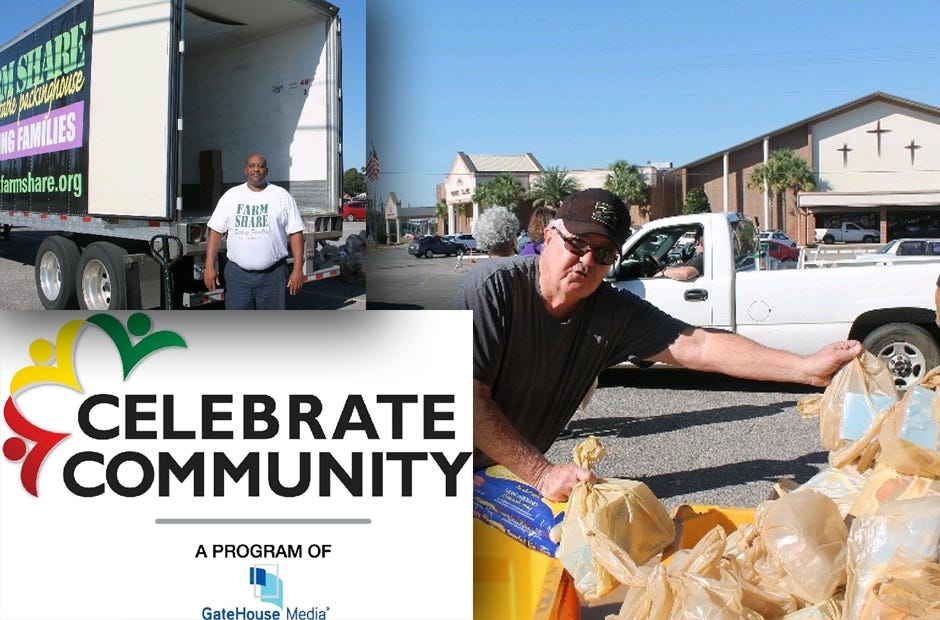
Editor's Note: This is part of our Celebrate Community series, which recognizes Santa Rosa County nonprofit organizations that improve our quality of life.
PACE — A semiautomatic truck full of food from Quincy, Fla., arrives at Pace Assembly of God to provide for 300-plus families.
It’s a familiar sight for one nonprofit organization.
SURPLUS FOR THE POOR
Patricia Robbins founded Farm Share in 1991 and reportedly has distributed over 400,000,000 pounds of food since then throughout Florida.
How does it work?
"Farm Share, using inmate labor and volunteers, re-sorts and packages an abundance of surplus food and distributes it to individuals, soup kitchens, homeless shelters, churches and other organizations feeding the hungry in Florida — free of charge,” the organization's website, farmshare.org, states.
And where does the surplus come from?
Well, almost half of every harvested crop is thrown away, "because if a tomato is slightly misshapen, discolored, too small, too big or blemished in any way, it will not meet the consumer demand for a ‘perfect’ tomato and will therefore be rejected,” the site states.
Rep. Mike Hill’s district secretary, Charles Withers, said Hill's office coordinates Farm Share events in Northwest Florida. Hill’s staff volunteered for Saturday's event in Pace. Hill said in 2013 he learned of Farm Share and brought the food-sharing program to Santa Rosa and Escambia counties.
How it works is simple: "We reach out to churches a couple months ahead to see if they'd be interested in hosting an event,” Withers said. “If they say yes, we reach out to Farm Share to let them know the church is on board and then coordinate a date."
In addition to food not cosmetically suited for store sales, Hill said some Farm Share food includes perishable items weeks away from expiring. Stores don't have time to stock and sell such items so Farm Share receives them for "pennies on the dollar," he said.
"There is enough food to feed 500 households a week for free,” Hill said.
‘I’VE SEEN GROWN MEN CRY’
The program’s funding, Hill said, comes from sales taxes from Florida Department of Agriculture Commissioner Adam Putnam's office. Hill said the funding amount last year was $1 million and was bumped up to $2 million this year.
Hill said sharing events take months to plan, but Farm Share is flexible enough to handle emergencies such as the 2014 flood and tornadoes earlier this year, when Farm Share diverted trucks going to other events to take care of displaced people in Santa Rosa County.
Willie Davis said he's been driving the semi and delivering food for Farm Share for three years.
"I've seen wonderful blessings to families, even working families … I've seen grown men cry (who are) out of work and don't know how to feed their families … I didn't know how many people were in need until I started this job."
Stephen Shelley, Farm Share’s chief operations officer since January, said Robbins’ idea began in Homestead, Fla., and gradually spread from county to county.
"She saw a lot of crops going to waste," he said. She began the program with a few farmers in the Homestead area "with a phone and a desk" and "now, there are five facilities: Homestead, Florida City, Pompano Beach, Jacksonville and Quincy … Last year (we donated) more than 40 million pounds of food."
Shelley said this number was a record, as was the previous year and the one before, exceeding those amounts by 5 to 6 million pounds each time.
EVERYTHING IS FREE
Not all Farm Share food comes straight from the fields. "Some donations come from stores like Publix, Winn-Dixie and Walmart and the post office does food drives,” Shelley said.
Food distribution agencies don't have to pay anything for Farm Share food.
Further, "There is no ID, no financial statements needed" to come pick up food, Withers said.
"Everything Farm Share does is free of charge; we don't charge individuals or agencies,” Shelley said. “Some food banks have maintenance fees, but we don't charge anyone anything. Funding comes from the state of Florida and county governments.
"This year's (funding), that started July, is now $2.2 million,” he said, adding it was an "effort from elected officials on the Florida House and Senate side. Advocates from all over Florida help fund Farm Share and help to feed people free of charge."
As for the program’s future?
Well, Shelley said Farm Share is "specifically focused on Florida (with) no plans to expand (outside Florida). We're focused on the state. We'd love to expand to the west coast. We'd like to establish (distribution) in the Lakeland/Tampa area."







This article originally appeared on Santa Rosa Press Gazette: FEEDING THE MULTITUDES
